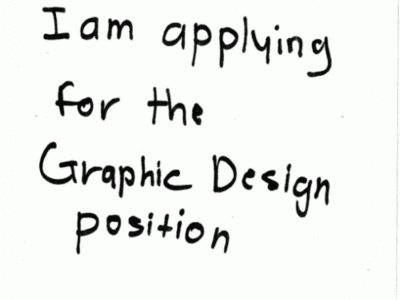The job market isn’t exactly working in our favor – if you haven’t noticed, consider yourself lucky. As a post-graduate job seeker myself, there’s no worse of a feeling than sending in a job application knowing it will be stacked in a virtual box behind 70 other applicants in probably no less than 24 hours.
The internet allows us to connect with jobs all over the country in our PJ pants while nursing a Buzzfeed addiction and enjoying a delightful snack. It's a great tool but has clear problems. To those who receive our resumes, we are just another Microsoft Word document; another e-mail alert on their phone; another faceless, personality-less resume full of flat bullet points.
Today, we don’t always have the opportunity to shake someone’s hand and charm them as we drop off a resume. Instead, we have cover letters – our one shot to convince someone we’re worth having around. They’re the only chance we have to show potential employers who we are as human beings rather than robot students. That’s why you should be putting more emphasis on writing them than you (probably) currently are.
1. Just Include It
First and foremost, always include a cover letter. Yes, I’m aware that they are rarely required. HELLO! Employers say they’re optional to weed out the lazies. If you’re not willing to write a three paragraph cover letter to GET the job, how lazy are you going to be ON the job? Like, clip-your-toenails-while-watching-YouTube-lazy, probably.
It’s your one shot to cut the crap and tell a company what you’re really about.
2. No Bullshit
Speaking of, you should indeed cut the crap. The necessary BS (that fundraiser – ehem, bikini carwash – you did for your sorority freshman year, the club you only joined for the free doughnuts, etc.) is all listed in your resume. Don’t repeat your credentials. Instead, expand on them. Don’t just tell them you’re smart, prove it – use your cover letter to elaborate on how the boring stuff in your resume authenticates your intelligence.
3. Keep it Short
If you were sorting through hundreds of job applications, how much would you want to read? And how long would it take to catch your attention before it was lost? Keep those things in mind. HR managers are humans, too. According to Vicki Salemi, author of “Big Career in the Big City,” three paragraphs is the ideal length. She also adds that whoever receives your letter is likely to only give it 10 seconds of their time before moving on. That means a bold beginning is essential.
4. It's Not ALL About You
Yes, graduation is quickly approaching and you desperately don't want to move back home, but this job opening is not all about you – remember your cover letter shouldn’t be either. Spend less time talking about why you’re great and more time talking about what you can do for that particular company (similarly, each cover letter should be unique, but if you use a universal one for each application, don’t you dare forget to change the name of the company).
5. Proofread
Consider a cover letter with errors the equivalent of showing up to an interview with your shirt unbuttoned. According to CNN, “Our company's research consistently shows that one or two typographical errors are enough to discourage a hiring manager from calling you back.” Most job postings are looking for someone who pays great attention to detail, and this is your first test.



















